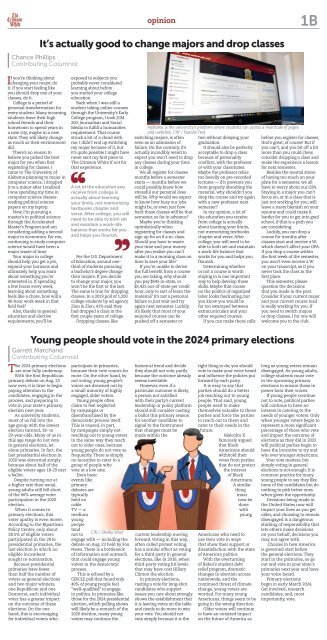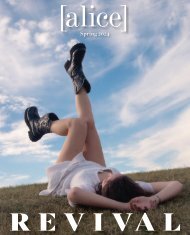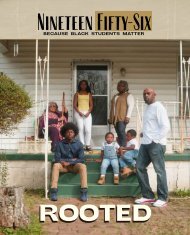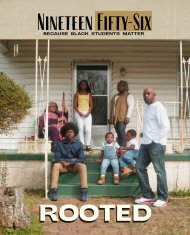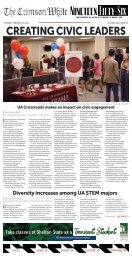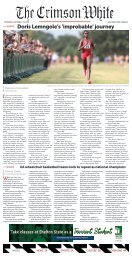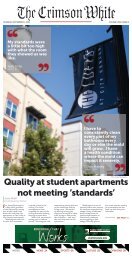The Crimson White Print Edition - August 24, 2023
You also want an ePaper? Increase the reach of your titles
YUMPU automatically turns print PDFs into web optimized ePapers that Google loves.
opinion<br />
1B<br />
It’s actually good to change majors and drop classes<br />
Chance Phillips<br />
Contributing Columnist<br />
If you’re thinking about<br />
changing your major, do<br />
it. If you start feeling like<br />
you should drop one of your<br />
classes, do it.<br />
College is a period of<br />
personal transformation for<br />
every student. Many incoming<br />
students leave their high<br />
school friends and their<br />
hometown to spend years in<br />
a new city, maybe in a new<br />
state. <strong>The</strong>y will likely change<br />
as much as their environment<br />
did.<br />
<strong>The</strong>re’s no reason to<br />
believe you picked the best<br />
major for you when first<br />
registering for classes. I<br />
came to <strong>The</strong> University of<br />
Alabama planning to major in<br />
computer science. I dropped<br />
it to a minor after I realized<br />
I was spending my time in<br />
computer science classes<br />
reading political science<br />
papers on my laptop.<br />
Now, I’m pursuing a<br />
master’s in political science<br />
through the Accelerated<br />
Master’s Program and am<br />
considering adding a second<br />
major in economics. For me,<br />
continuing to study computer<br />
science would have been a<br />
major waste of time.<br />
Your major in college<br />
should help you get a job,<br />
expand your horizons and<br />
ultimately help you learn<br />
about something you’re<br />
interested in. If spending<br />
a few hours every week<br />
learning about something<br />
feels like a chore, how will a<br />
40-hour work week in that<br />
field feel?<br />
Also, thanks to general<br />
education and elective<br />
requirements, you’ll be<br />
exposed to subjects you<br />
probably never considered<br />
learning about before<br />
you started your college<br />
education.<br />
Back when I was still a<br />
student taking online courses<br />
through the University’s Early<br />
College program, I took JCM<br />
200: Journalism and Social<br />
Media to fulfill a humanities<br />
requirement. That course<br />
struck a bit of a chord with<br />
me. I didn’t end up switching<br />
my major because of it, but<br />
it’s quite possible I might have<br />
never sent my first piece to<br />
<strong>The</strong> <strong>Crimson</strong> <strong>White</strong> if not for<br />
that experience.<br />
A lot of the education you<br />
receive from college is<br />
actually about learning<br />
your limits, not memorizing<br />
textbooks chapter and<br />
verse. After college, you will<br />
need to be able to both set<br />
and maintain a work-life<br />
balance that works for you<br />
and helps you flourish.<br />
Per the U.S. Department<br />
of Education, around onethird<br />
of students pursuing<br />
a bachelor’s degree change<br />
their majors. If you decide<br />
to change your major, you<br />
won’t be the first or the last.<br />
<strong>The</strong> same is true for dropping<br />
classes. In a 2019 poll of 1,200<br />
college students by ad agency<br />
Zion & Zion, 41% said they<br />
had dropped a class in the<br />
first couple years of college.<br />
Dropping classes, like<br />
myBama is the university’s platform where students can access a multitude of pages<br />
and websites. CW / Natalie Teat<br />
switching majors, is often two without delaying your<br />
seen as an admission of graduation.<br />
failure. On the contrary, it’s It should also be perfectly<br />
actually incredibly weird to acceptable to drop a class<br />
expect you won’t need to drop because of personality<br />
any classes during your time conflicts, with the professor<br />
in college.<br />
or with your classmates.<br />
We all register for classes Maybe the professor relies<br />
months before a semester too heavily on pre-recorded<br />
starts — months before we lectures — if it prevents you<br />
could possibly know how from properly absorbing the<br />
stressful our personal lives material, why shouldn’t you<br />
will be. Why would we expect drop the course and try again<br />
to know how busy our jobs with a new professor next<br />
might be, or even just how semester?<br />
hard those classes will be that In my opinion, a lot of<br />
semester, so far in advance? the education you receive<br />
Maybe you’re thinking from college is actually<br />
optimistically when<br />
about learning your limits,<br />
registering for classes and not memorizing textbooks<br />
sign up for an 8 a.m. class. chapter and verse. After<br />
Should you have to waste college, you will need to be<br />
your time and your money able to both set and maintain<br />
after you realize you can’t a work-life balance that<br />
make it to a morning class on works for you and helps you<br />
time to save your life?<br />
flourish.<br />
If you’re unable to derive Determining whether<br />
the full benefit from a course or not a course is worth<br />
you are taking, why should staying in is one important<br />
you pay $545 in-state, or way to help develop those<br />
$1,425 out-of-state per credit skills. Maybe that course<br />
hour, only to sort of learn the on the politics of organized<br />
material? It’s not a personal labor looks fascinating, but<br />
failure to just wait and try you know you would be<br />
again next semester. Luckily, far too swamped between<br />
it’s likely that most of your extracurriculars and your<br />
required courses can be other required courses.<br />
pushed off a semester or<br />
If you can make those calls<br />
before you register for classes,<br />
that’s great, of course! But if<br />
you can’t, and you bit off a bit<br />
more than you could chew,<br />
consider dropping a class and<br />
make the experience a lesson<br />
for next semester.<br />
Besides the mental stress<br />
of having too much on your<br />
plate for a semester, we all<br />
have to worry about our GPA.<br />
Staying in a major you can’t<br />
focus on, or in a class that is<br />
just not working for you, will<br />
leave a nasty blemish on your<br />
resume and could make it<br />
harder for you to get into grad<br />
school, if that is a path you<br />
are considering.<br />
Luckily, you can drop a<br />
course for months after<br />
classes start and receive a W,<br />
which doesn’t affect your GPA.<br />
If you drop a course within<br />
the first week of the semester,<br />
you won’t even receive a W<br />
on your transcript, as if you<br />
never took the class in the<br />
first place.<br />
This semester, please<br />
question the decisions<br />
that you made in the past.<br />
Consider if your current major<br />
and your current course load<br />
is really working for you. If<br />
you need to switch majors<br />
or drop classes, I for one will<br />
welcome you to the club.<br />
Young people should vote in the 20<strong>24</strong> primary elections<br />
Garrett Marchand<br />
Contributing Columnist<br />
<strong>The</strong> 20<strong>24</strong> primary elections<br />
are now fully underway.<br />
With the first Republican<br />
primary debate on Aug. 23<br />
now over, it is time to begin<br />
paying attention to the<br />
candidates, engaging in the<br />
process, and preparing to<br />
vote in your state's primary<br />
election next year.<br />
As university students,<br />
most of us fall into the<br />
age group with the lowest<br />
election turnout, 18- to<br />
29-year-olds. Many of us in<br />
this age range do not vote<br />
in general elections, let<br />
alone primaries. In fact, the<br />
last presidential election in<br />
2020 was abnormal simply<br />
because about half of the<br />
eligible voters ages 18-29 cast<br />
a ballot.<br />
Despite turning out at<br />
a higher rate than usual,<br />
young adults still fell short<br />
of the 66% average voter<br />
participation in the 2020<br />
election.<br />
When it comes to<br />
primary elections, this<br />
voter apathy is even worse.<br />
According to the Bipartisan<br />
Policy Center, only about<br />
28.5% of eligible voters<br />
participated in the 2016<br />
presidential primaries, the<br />
last election in which no<br />
eligible incumbent<br />
sought re-nomination.<br />
Because presidential<br />
primaries have fewer<br />
than half the number of<br />
voters as general elections<br />
and two major winners,<br />
one Republican and one<br />
Democrat, each individual<br />
voter has a greater impact<br />
on the outcome of these<br />
elections. On the one<br />
hand, this is encouraging<br />
for individual voters who<br />
participate in primaries,<br />
because their vote counts for<br />
more. On the other hand, by<br />
not voting, young people’s<br />
voices are drowned out by<br />
a small minority of highly<br />
engaged, older voters.<br />
Young people often<br />
claim to feel neglected<br />
by campaigns or<br />
disenfranchised by the<br />
democratic process itself.<br />
This is caused, in part,<br />
by campaigns simply not<br />
reaching out to young voters<br />
in the same way they reach<br />
out to older ones, because<br />
young people do not vote as<br />
frequently. <strong>The</strong>re is simply<br />
no incentive to cater to a<br />
group of people who<br />
vote at a low rate.<br />
Even basic<br />
events like<br />
primary<br />
debates are<br />
typically<br />
held on<br />
cable<br />
TV — a<br />
medium<br />
young<br />
people<br />
tend<br />
not to<br />
CW / Shelby West<br />
engage with — including the<br />
debate on Aug. 23 held by Fox<br />
News. <strong>The</strong>re is a bottleneck<br />
of information and outreach<br />
that could engage young<br />
voters in the democratic<br />
process.<br />
This is echoed by a<br />
CIRCLE poll that found only<br />
40% of young people feel<br />
“well-qualified” to engage<br />
in politics. In primaries like<br />
those for the 20<strong>24</strong> presidential<br />
election, which polling shows<br />
will likely be a rematch of the<br />
2020 election, many young<br />
voters may continue the<br />
historical trend and decide<br />
they should not vote, partly<br />
because the outcome already<br />
seems inevitable.<br />
However, even if a<br />
particular outcome is likely,<br />
a person not satisfied<br />
with their party’s current<br />
leadership or policy platform<br />
should still consider casting<br />
a ballot this primary season<br />
for another candidate to<br />
signal to the frontrunner<br />
that changes must be<br />
made within the<br />
current leadership moving<br />
forward. Voting in this way,<br />
often called protest voting,<br />
has a similar effect as voting<br />
for a third party in general<br />
elections, like in 2016, when<br />
third-party voting hit levels<br />
that may have cost Hillary<br />
Clinton the election.<br />
In primary elections,<br />
casting a vote for long-shot<br />
candidates who support<br />
issues you care about strongly<br />
shows the establishment that<br />
it is leaving votes on the table<br />
and needs to do more to win<br />
your vote. You should not<br />
vote simply because it is the<br />
right thing to do; you should<br />
vote to make your voice heard<br />
and influence the policies put<br />
forward by each party.<br />
It is easy to say that<br />
parties should do a better<br />
job reaching out to young<br />
people. That said, young<br />
people need to make<br />
themselves valuable to these<br />
parties and force the parties<br />
to reach out to them and<br />
cater to their needs in the<br />
future.<br />
Malcolm X<br />
famously argued<br />
that Black<br />
Americans should<br />
withhold their<br />
votes from parties<br />
that do not protect<br />
the interest<br />
of Black<br />
Americans.<br />
A similar<br />
thing<br />
must<br />
now be<br />
done<br />
with<br />
young<br />
Americans who need to<br />
use their vote in ways<br />
that show their support or<br />
dissatisfaction with the state<br />
of American politics.<br />
With the overturning<br />
of Biden’s student debt<br />
relief program, dramatic<br />
changes in abortion access<br />
nationwide, and the<br />
continued threat of climate<br />
change, young voters are<br />
worried. For many young<br />
Americans, things seem to be<br />
going in the wrong direction.<br />
Older voters will continue<br />
to have an outsized impact<br />
on the future of America as<br />
long as young voters remain<br />
disengaged. As young adults,<br />
college students must vote<br />
in the upcoming primary<br />
elections to ensure those in<br />
power hear their voices.<br />
If young people continue<br />
not to vote, political parties<br />
will continue to have no<br />
interest in catering to the<br />
needs of younger voters. Only<br />
when younger voters begin to<br />
represent a more significant<br />
percentage of those who vote<br />
and impact the outcome of<br />
elections as they did in 2022<br />
will political parties begin to<br />
have the incentive to try and<br />
win over younger Americans.<br />
Your vote matters, but<br />
simply voting in general<br />
elections is not enough. It is<br />
common practice for many<br />
young people to say they like<br />
none of the candidates but do<br />
nothing to pick better ones<br />
when given the opportunity.<br />
Decisions being made in<br />
the United States now will<br />
impact your lives as you get<br />
older, and choosing to remain<br />
disengaged is a dangerous<br />
shirking of responsibility that<br />
lets others make decisions<br />
on your behalf, decisions you<br />
may not agree with.<br />
Choices in how America<br />
is governed start before<br />
the general elections. <strong>The</strong>y<br />
start in the primaries, so go<br />
out and vote in your state's<br />
primaries next year and have<br />
your voice heard.<br />
Primary elections<br />
begin in early March 20<strong>24</strong>.<br />
Get involved, research<br />
candidates, and, most<br />
importantly, vote.


